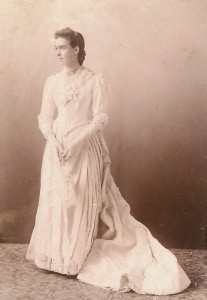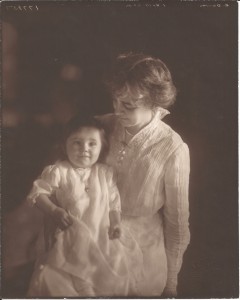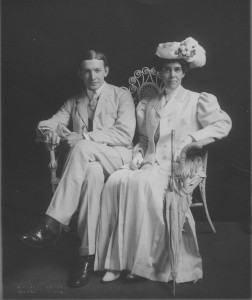
By Molly Kettler, EHC Archives Volunteer and Sunday Docent
To visitors of the Evanston History Center, the accomplishments of Caro Blymyer Dawes (1866 – 1957) may not be as well-known as those of her husband, Charles Gates Dawes (1865-1951). Charles would be the first to agree that Caro deserves recognition for her devotion to her family and friends as well as to her charitable endeavors. His letters and diary convey his tremendous depth of devotion and respect for her. Charles made the following entry in his diary for April 1908 regarding Caro and her influence upon their children Rufus Fearing (age 18) and Carolyn (age 16):
I want here to pay my tribute to my wife who has been my faithful help-mate for so many years. The sterling qualities which my children are developing are due to her strong and kindly discipline and, above all, to the perfect example she sets – to her consistent recognition in her daily life to Christian principles. So much more than I, has she recognized the danger to our children of the indulgences which our affection for them and our ability to grant them render it so difficult to deny. Her devotion to us all, we must always remember and always shall. Whatever our children become, to her must belong the credit.[i]
Charles often complimented Caro on her adeptness at household management and social event planning. Because of his superb confidence in his wife’s ability, Charles did not worry about inviting guests on a moment’s notice for lunch or dinner whether at their home in Evanston, Washington, D.C. or at the American Embassy in England. Caro accommodated last minute invitations with grace and efficiency.
Charles was especially proud and admiring of his wife’s organizational work to provide clothing for his World War I regiment. He sent her numerous letters and telegrams from Paris acknowledging and thanking her for her contributions. Caro provided the wool to any volunteers whom she could find to knit sweaters and socks. Such volunteers included all the stenographers and office clerks at Dawes’ bank, the Central Trust Company, as well as relatives of the men in the regiment. During the fall of 1917, Caro and her recruits knitted over 1000 sweaters for the 17th Army Corp of Engineers. Charles wrote to her, “If you were in this chilly, wet climate, you would understand what a Godsend these sweaters are. There is no more important work you could do.”[ii] In December 1917, she sent Christmas packages for every man in the regiment totaling approximately 1,200.[iii] By April 1918, Charles wrote to say the “army [is] now fully supplied with sweaters … suggest you put your organization at making socks.”[iv] The officers and enlisted men communicated their thanks to Mrs. Dawes on many occasions. Back home, a newspaper article gave her the title “Mother of the Regiment” and listed total contributions by that time as 2,000 sweaters and 1,100 pairs of socks.[v]

Mrs. Dawes’ charitable endeavors were not limited to wartime. Her dedication to helping children other than her own spanned over half a century. In 1907, Caro was elected second vice-president to the first board of directors of the Illinois Children’s Home and Aid Society (ICHAS). She then became assistant treasurer in 1909 and served in that position for at least twenty years. The purpose of the ICHAS was to find private, family homes for orphaned and abandoned children as opposed to institutions. The organization had a network of receiving (foster) homes which cared for children awaiting adoption. [vi] When the ICHAS receiving homes were at capacity or infants needed extra care, Caro would provide foster care in her own Evanston home, hiring a nurse when necessary. Even after she and Charles adopted two babies, Dana in 1912 and Virginia in 1914, she continued to foster others.[vii] Mrs. Dawes was also one of the founding directors of The Cradle adoption agency in 1923. She volunteered at the agency four or five times a week and continued to host events when she was in her mid-70s.[viii] After her death in 1957, The Cradle Society eulogized her as follows:
She unselfishly went her way, always self-effacing, joyous, calm, unhurried – a kindly, considerate and understanding friend. Unfailingly she reflected her love for her God, her family, and her fellow beings … To be reminded of her is to be reminded of the words of the poet who wrote, ‘Life’s tale told with perfect grace.’[ix]
Her friends and family undoubtedly agreed with The Cradle Society’s depiction of Caro.

Mrs. Dawes was a friend to several of our nation’s First Ladies. She had an especially close relationship with Ida Saxton McKinley. Charles and Caro frequently dined with the McKinleys at the White House prior to and during his term as Comptroller of the Currency. The two couples even took vacations together.[x] After President McKinley was assassinated in 1901, Caro kept in close contact with Ida to try to lift her out of depression. Caro sent fresh flowers to Ida at her home in Ohio every few weeks until Ida’s death in 1907. Ida wrote Caro to express her appreciation for the flowers and to share news about each other’s families. Ida closed her letters with the phrase, “I remain as ever your loving friend.”[xi] When Charles’ political career resumed during the 1920s, Caro also became friends with Florence King Harding, Grace Coolidge, and Lou Henry Hoover.
Caro fulfilled the traditional roles of wife, mother, friend, and volunteer with the utmost devotion and enthusiasm. All available records suggest that she was deeply satisfied with her life. While many articles written during her lifetime described Mrs. Dawes’ activities in relationship to her husband’s career, Caro had significant achievements of her own. She was very humble and shied away from publicity even when part of Washington “society.”[xii] That is why it is important for the Evanston History Center to keep her memory alive both as the “beloved Caro” to her friends and family and as the public and official “Mrs. Dawes.”

Thanks so much for this piece. I’ve read and heard a lot about Grandfather, but much less about Grandmother. I was 6 or 7 when she died, but what you’ve written certainly matches my recollections of her.
Thanks so much for your comment.
So sorry I cannot join the parade tomorrow! My great-aunt, Florence Sherwood, was a union leader, suffragist, and speaker. When she married, it was announced in the paper that she would use the name Sickenger only for things like a mortgage…ahead of her time always. She marched in Chicago with Mrs. Palmer, a Pankhurst sister, etc. Has anyone come across her in their research? Glad Dawes house has re-opened. Keep up the good work, ladies! Susan Sherwood
Thanks so much for your comment. We do not have information about Florence Sherwood and would love to know more. Please contact the project at [email protected]. Thanks!